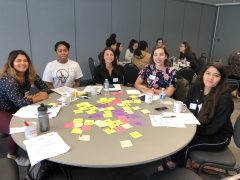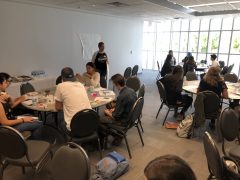


This past Friday, the CHAIM Centre hosted the official launch event for the ONE HEALtH Student Challenge 2018. The event was marked with fabulous speakers, whose personal and professional stories gave the student participants great insight into a One Health perspective, and into the Challenge itself. The One Health approach focuses on the connections between human health, animal/wildlife health, and the health of the environment. Essentially, these are all inextricably connected, and one affects the other. While this may seem intuitive, this approach is often underutilized in problem solving. The challenge this year is for students to design a plan to mitigate the physical and mental health risks, and facilitate community rebuilding following a natural disaster, with a particular focus on First Nations communities in Canada’s northern regions. For students participating, thinking of animal and environmental factors may be the toughest part. As Kim Matheson, director of the CHAIM Centre, pointed out, “it’s going to be way easier to think of the human aspect.” Students must push themselves to think of different perspectives.
A focus of the ONE HEALtH Student Challenge 2018 is to think beyond one’s own discipline. Paul Pechan, from the Lugwig Maximilians Universität Müchen, spoke about his personal experience in a career switch from plant physiology to science communications. (Of course, this simplifies many subtleties and accomplishments in between). Pechan advised students to “bring people together in an environment that can help you move forward with your questions.” He stressed that “you don’t have to be an expert in everything,” as any problem “cannot be solved with just the one perspective.” This was a goal of the launch event: to bring students, project consultants*, and guest speakers together to start thinking of out of the box ways to approach a problem.
What will students gain from this challenge? While an internship in a research lab is at stake, the focus is on the learning experience to be gained. Cathy Edwards, research facilitator and guest speaker at the launch, says she is hoping that students learn “the value of falling in love with a problem.” Moreover, she hopes students are “taking the time to gain empathy and develop insights based on the lived experience.”
The lived experience can only be understood from those who have lived it (of course), and guest speakers Craig Linklater and Darrel Shorting provided a moving account of living through the evacuation of Little Saskatchewan due to a 2011 manmade flood. Shorting spoke of the devastating effects of a twenty-four hour notice of evacuation, and provided a vivid recount as he “literally saw … water rising.” The community is still (seven years later) struggling to get home again. For those who have been able to return, it has been difficult getting used to new living situations which are a stark contrast to their way of life prior to the evacuation. Shorting vividly described damage to the ecosystem, infrastructure, and community gathering spots that have yet to be repaired. This has affected the physical and mental health of evacuees, and the community at large, including elders, councillors, families, youth, and children who have never lived in the community yet as their family is still in evacuation. Shorting said, “this 2011 flood created hardship for our people.” As a councillor, he still continues to “receive phone calls at 1:30 in the morning” from displaced community members. Through listening to Linklater and Shorting speak, we hope students not only gain empathy and insight, but use this lived experience to create an effective framework that can mitigate the harmful and long-lasting effects of a future crisis.
Over the next six weeks, student teams will be working on their frameworks with the help of graduate mentors and project consultants. They will be seeking new perspectives while considering human, animal, and environmental factors of a natural disaster. But most importantly, in considering a problem, as Kim Matheson urged students, it is imperative to “be brave, go beyond the things that you know.”
We look forward to seeing these frameworks develop over the next few weeks, and will be posting updates here.**
*Our project consultants range from faculty in neuroscience, biology, communications and environmental engineering, just to name a few. You can find a list of our consultants here: https://carleton.ca/chaimcentre/the-2018-challenge/one-health-consultants/
**And on our Twitter account: @CHAIM_Centre